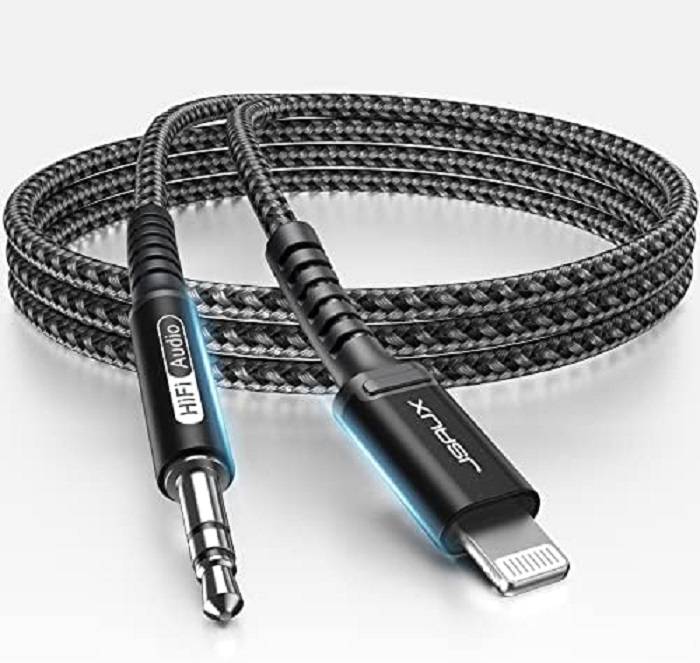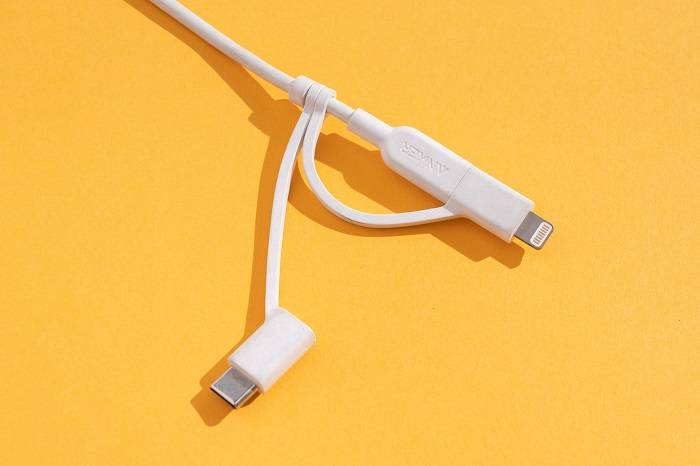Table of Contents
In the ever-evolving landscape of technology, the removal of the headphone jack from iPhones sparked a significant shift in how users access audio. With the advent of wireless connectivity, many lamented the absence of the traditional aux port. However, fear not! The iPhone aux adapter comes to the rescue, offering a bridge between the old and the new, ensuring seamless audio connectivity for your devices. In this comprehensive guide, we delve into everything you need to know about iPhone aux adapters, from their types and functionality to tips for choosing the right one for your needs.
Understanding iPhone Aux Adapters: An Overview

Before delving into the specifics, let’s first understand what an iPhone aux adapter is and why it’s essential. Simply put, an iPhone aux adapter is a small accessory that allows you to connect your iPhone to devices that utilize a 3.5mm audio jack. This includes headphones, speakers, car stereos, and more. With the removal of the headphone jack from newer iPhone models, aux adapters have become indispensable for users who still rely on wired audio connections.
Types of iPhone Aux Adapters
There are several types of iPhone aux adapters available on the market, each catering to different needs and preferences. Here are the most common ones:
Lightning to 3.5mm Adapter
- The Lightning to 3.5mm adapter is the official adapter provided by Apple. It connects to the Lightning port on your iPhone and features a 3.5mm audio jack on the other end, allowing you to connect standard headphones and audio devices.
- Pros: Official Apple product, widely available, ensures compatibility.
- Cons: Relatively expensive compared to third-party alternatives, prone to wear and tear.
Bluetooth Aux Adapter
- Bluetooth aux adapters provide a wireless solution for connecting your iPhone to devices that use a 3.5mm audio jack. These adapters pair with your iPhone via Bluetooth and transmit audio wirelessly to the connected device.
- Pros: Wireless connectivity, no need for physical connection, versatility.
- Cons: Requires charging, potential audio quality loss due to compression, compatibility issues with older devices.
USB-C to 3.5mm Adapter
- With the transition to USB-C ports in some newer iPhone models, USB-C to 3.5mm adapters have become increasingly popular. These adapters allow you to connect devices with a 3.5mm audio jack to your iPhone via the USB-C port.
- Pros: Compatibility with USB-C devices, reliable connection.
- Cons: Limited availability compared to Lightning adapters, may not be suitable for older iPhone models.
Choosing the Right iPhone Aux Adapter

When selecting an iPhone aux adapter, there are several factors to consider to ensure compatibility and functionality:
Device Compatibility
Ensure that the adapter you choose is compatible with your iPhone model. Different iPhone models may require different types of adapters, such as Lightning or USB-C.
Audio Quality
Consider the audio quality offered by the adapter. While Bluetooth adapters provide convenience, they may result in audio compression and reduced sound quality compared to wired connections.
Build Quality
Look for adapters made from high-quality materials that can withstand frequent use. A durable adapter is less likely to break or malfunction over time.
Additional Features
Some adapters may offer additional features such as volume control, microphone support, or pass-through charging. Evaluate your needs and preferences to determine which features are essential for you.
Tips for Using iPhone Aux Adapters
To maximize the performance and longevity of your iPhone aux adapter, consider the following tips:
Handle with Care
Treat your adapter gently and avoid bending or twisting it excessively. Proper handling can help prevent damage and ensure a reliable connection.
Keep it Clean
Periodically clean the connectors of your adapter to remove dirt, dust, and debris. This can help maintain optimal audio quality and prevent connectivity issues.
Invest in Quality
While it may be tempting to opt for the cheapest adapter available, investing in a quality adapter from a reputable brand can save you from headaches in the long run. Quality adapters are more likely to offer reliable performance and durability.
Consider Wireless Alternatives
If you frequently encounter issues with wired connections or prefer the convenience of wireless audio, consider investing in a Bluetooth aux adapter. Just be mindful of potential audio quality trade-offs.
The iPhone aux adapter serves as a crucial link between your iPhone and traditional audio devices, allowing you to enjoy your favorite music, podcasts, and videos without compromise. Whether you opt for a Lightning adapter, Bluetooth adapter, or USB-C adapter, choosing the right one for your needs can enhance your audio experience and ensure seamless connectivity. By understanding the different types of adapters available, considering key factors such as compatibility and audio quality, and following best practices for usage, you can make the most of your iPhone aux adapter and embrace the future of audio connectivity.
Exploring Advanced Features and Innovations in iPhone Aux Adapters

As technology continues to advance, so too do the features and innovations in iPhone aux adapters. In this section, we’ll explore some of the more advanced functionalities offered by modern adapters, as well as innovative designs that enhance the user experience.
Active Noise Cancellation (ANC)
Some premium iPhone aux adapters come equipped with active noise cancellation technology, which helps to block out ambient noise and improve audio clarity. This feature is particularly useful in noisy environments such as airplanes or crowded streets, allowing you to enjoy your audio content without distractions.
Hi-Res Audio Support
For audiophiles seeking the highest possible audio quality, certain iPhone aux adapters support hi-res audio formats such as FLAC and ALAC. These adapters utilize advanced digital-to-analog converters (DACs) to reproduce audio with exceptional clarity and fidelity, delivering an immersive listening experience.
Multi-Device Connectivity
Multi-device connectivity is a convenient feature found in some Bluetooth aux adapters, allowing you to connect and switch between multiple devices seamlessly. Whether you’re switching between your iPhone, iPad, or laptop, these adapters make it easy to enjoy audio from your preferred device without the hassle of constantly reconnecting.
Smart Controls and Voice Assistants
Some iPhone aux adapters incorporate smart controls and voice assistant integration, enabling hands-free operation and voice commands. With built-in controls for play/pause, volume adjustment, and track navigation, as well as support for voice assistants like Siri and Google Assistant, these adapters offer enhanced convenience and accessibility.
Compact and Portable Designs
In addition to advanced features, many iPhone aux adapters boast compact and portable designs that make them ideal companions for on-the-go use. Whether you’re traveling, commuting, or simply out and about, these adapters are lightweight and easy to carry, ensuring that you always have access to your favorite audio content.
Wireless Charging Compatibility
Some Bluetooth aux adapters feature wireless charging compatibility, allowing you to charge your iPhone wirelessly while using the adapter. This eliminates the need for separate charging cables and ensures uninterrupted audio playback, making it a convenient solution for users who prioritize convenience and versatility.
Customizable Sound Profiles
Advanced iPhone aux adapters may offer customizable sound profiles and equalizer settings, allowing you to tailor the audio output to suit your personal preferences. Whether you prefer enhanced bass, crisp treble, or a balanced sound signature, these adapters empower you to fine-tune your listening experience to perfection.
Enhanced Durability and Water Resistance
For users who lead active lifestyles or work in rugged environments, certain iPhone aux adapters feature enhanced durability and water resistance. These adapters are designed to withstand the rigors of daily use, whether you’re hiking, cycling, or working outdoors, ensuring reliable performance in any conditions.
Related Post:
Exploring the Differences Between Hot Shoe and Cold Shoe Mounts: A Comprehensive Guide
Dynamic Microphone vs. Condenser Microphone: Unveiling the Key Differences
Connecting a Microphone to Your iPhone: A Comprehensive Guide
As technology continues to evolve, iPhone aux adapters remain at the forefront of audio connectivity, offering a bridge between the past and the future. Whether you’re using a Lightning adapter, Bluetooth adapter, or USB-C adapter, the wide range of features and innovations available ensures that you can enjoy your favorite audio content with unparalleled convenience and quality.
By exploring advanced functionalities such as active noise cancellation, hi-res audio support, multi-device connectivity, and smart controls, you can elevate your audio experience to new heights. Whether you’re a music enthusiast, podcast aficionado, or avid gamer, there’s an iPhone aux adapter out there to suit your needs and preferences.
As you embark on your journey to find the perfect iPhone aux adapter, consider the features that matter most to you, whether it’s audio quality, convenience, or durability. With the right adapter by your side, you can embrace the future of audio connectivity and enjoy your favorite content anytime, anywhere.

